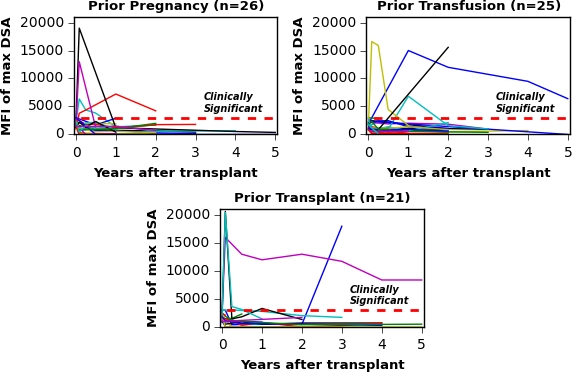Type of Sensitization Does Not Impact Kidney Graft Outcome in Weakly Sensitized Patients.
1Surgery, University of Pennsylvania, Philadelphia, PA
2Medicine, University of Pennsylvania, Philadelphia, PA
3Pathology, University of Pennsylvania, Philadelphia, PA.
Meeting: 2016 American Transplant Congress
Abstract number: D19
Keywords: Alloantibodies, Graft failure, Rejection, Sensitization
Session Information
Session Name: Poster Session D: Antibody Mediated Rejection: Session #2
Session Type: Poster Session
Date: Tuesday, June 14, 2016
Session Time: 6:00pm-7:00pm
 Presentation Time: 6:00pm-7:00pm
Presentation Time: 6:00pm-7:00pm
Location: Halls C&D
Introduction: The impact of low level sensitization on kidney transplant (KTx) outcomes is unclear. While limited data suggest that KTx outcomes are comparable between weakly sensitized and naïve recipients, memory responses in sensitized patients may result in rapid elevations of post-transplant donor-specific antibody (DSA). We hypothesize that differences in the immunologic milieu of alloantigen encounter during initial sensitization impact the level of post-transplant DSA and alter early post-transplant outcomes.
Methods: We retrospectively compared clinical and immunologic outcomes among 71 weakly sensitized KTx recipients at a tertiary care center [1/1/2008-6/31/2014] who had low level pre-transplant DSA [mean fluorescence intensity (MFI) 800-3000, measured by Luminex® antigen beads] and documented exposure to only one sensitizing event [pregnancy (pr) vs. transfusion (tf) vs. transplantation (tx)].
Results: After 3.4±1.8 years of follow-up, no differences in clinical or immunologic outcomes were detected between the groups of sensitized patients (Table). Although post-transplant DSA did increase markedly in select patients (Figure, lines represent individual patients), there was no difference in this event frequency or magnitude across the groups (Table, Figure).
Conclusion: Patient and graft outcomes do not differ significantly based on the sensitizing event in patients with low level pre-transplant DSA. Type of sensitizing event does not contraindicate transplantation in patients with low level DSA or appear to predict early post-transplant outcomes.
| Pr (n=26) | Tf (n=25) | Tx (n=21) | p value | |
| 3-yr Patient Survival | 96% | 100% | 81% | 0.30 |
| 3-yr Graft Survival | 100% | 100% | 87% | 0.23 |
| eGFR | ||||
| 1 year | 59±22 | 62±26 | 70±25 | 0.42 |
| 3 year | 57±24 | 52±3 | 63±35 | 0.82 |
| Post-KTx DSA (MFI>3000) | 19% | 16% | 25% | 0.75 |
| Biopsy Rate | 27% | 44% | 50% | 0.24 |
| Rejection | 15% | 20% | 20% | 0.72 |
| ACR | 4% | 20% | 25% | 0.11 |
| AMR | 12% | 4% | 5% | 0.53 |

CITATION INFORMATION: Morrison A, Sawinski D, Lim M, Levine M, Kamoun M, Porrett P. Type of Sensitization Does Not Impact Kidney Graft Outcome in Weakly Sensitized Patients. Am J Transplant. 2016;16 (suppl 3).
To cite this abstract in AMA style:
Morrison A, Sawinski D, Lim M, Levine M, Kamoun M, Porrett P. Type of Sensitization Does Not Impact Kidney Graft Outcome in Weakly Sensitized Patients. [abstract]. Am J Transplant. 2016; 16 (suppl 3). https://atcmeetingabstracts.com/abstract/type-of-sensitization-does-not-impact-kidney-graft-outcome-in-weakly-sensitized-patients/. Accessed February 21, 2026.« Back to 2016 American Transplant Congress
